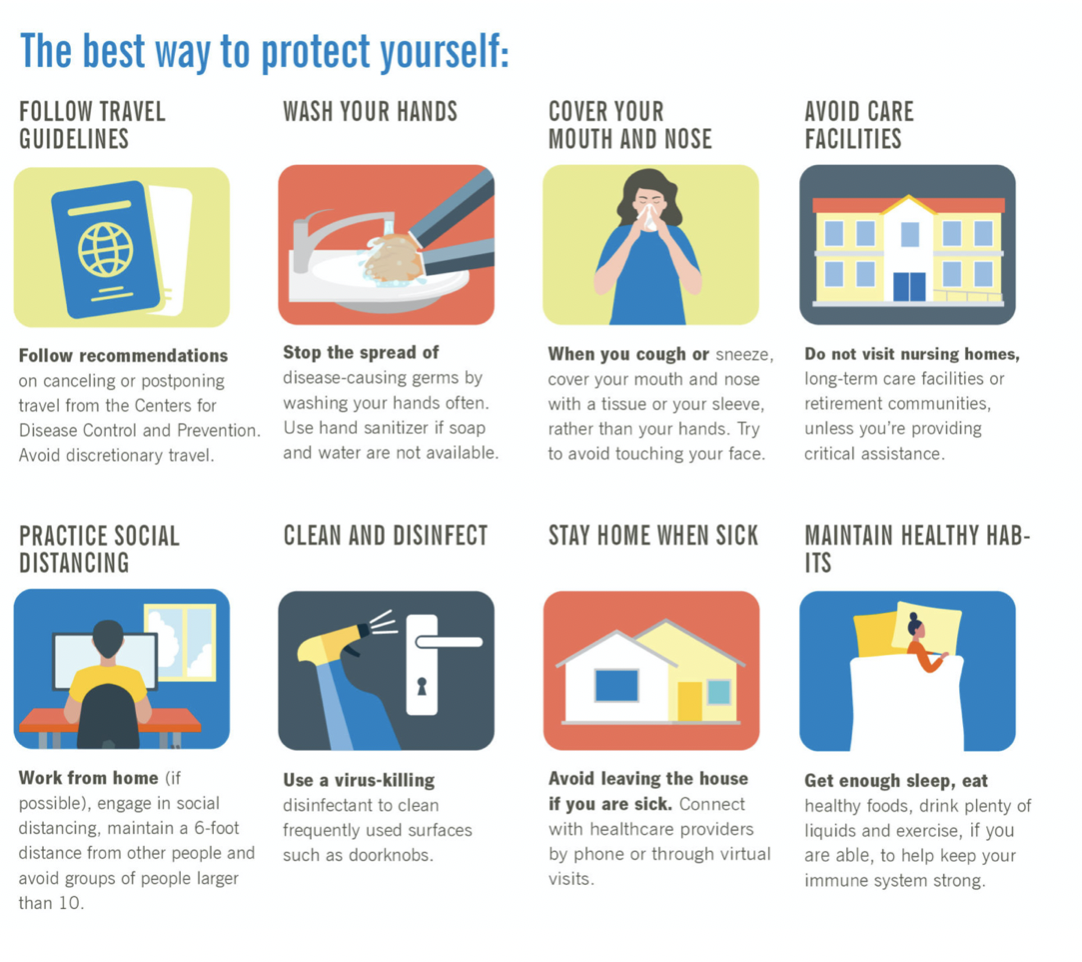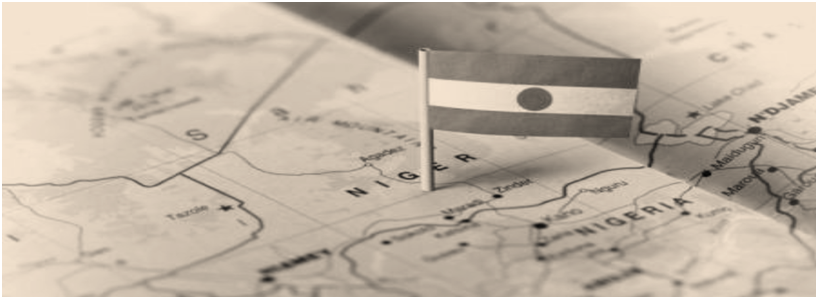
Weekly Highlights
- Parliament approves changes to Niger’s criminal procedure code
- Covid-19: Niger has passed the 1,000 positive case mark
- Turkey to send medical aid to Niger, Chad
- In the Sahel, hunger does not wait; donors must commit now
- Hijacking in the Nigerien Ministry of Defense: Lawyers for suppliers’ counterattack
- Niger exchange rate – Exchange rates West African CFA franc – USD = 585.555 XOF XOF= 0.00170778 USD
EXECUTIVE SUMMARY
Parliament approves changes to Niger’s criminal procedure code
Nigerien parliamentarians ratified this Friday, June 19, 2020, the bill amending the code of criminal procedure in Niger. This reform of the Nigerian criminal law enforcement system aims to make justice more accessible at short notice and to relieve congestion in penal establishments. Indeed, recalls the Commission for General and Institutional Affairs (CAGI), ” despite the relevance of this reform, the criminal chambers created before the high courts have still not begun to sit, thus leaving the Courts of Assize the care to continue to judge the pending criminal files ”.
Covid-19: Niger has passed the 1,000 positive case mark
Niger registered 36 new Covid-19 positive cases on June 16, bringing the total number of confirmed cases to 1,016, according to a statement from the Ministry of Health. The 36 new cases, including 29 men and seven women, are all Nigerien citizens who came from a neighboring country last Monday, said Health Minister Idi Illiassou Mainassara. The same press release reports that no new deaths related to Covid-19 have been recorded. Niger has therefore registered to date, 1,016 people positive for Covid-19, including 885 recovered, 65 on treatment and 66 deaths.
Turkey to send medical aid to Niger, Chad
Turkey will send medical aid to Niger and Chad under agreements signed with these countries, according to a ruling published in the Official Gazette on Wednesday. “The agreement between the government of the Republic of Turkey and the government of the Republic of Niger on donation in the field of health” was signed on May 21 in Ankara, read the gazette. As part of the deal, Turkey will donate a number of medical supplies including “50,000 surgical masks, 50,000 overalls, 30,000 N95 masks and 2,000 protective glasses.” “This donation is granted by the government of the Republic of Turkey to the government of the Republic of Niger as a gesture of friendship and goodwill,” the agreement said.
In the Sahel, hunger does not wait; donors must commit now
As violence and massacres continue, forcing more and more people to flee their homes, humanitarian needs are exploding, and funding is slow to arrive. Halfway through 2020, humanitarian response plans in the Sahel remain only 26% or less funded. Already in 2019, only half of the necessary funding had been mobilized. “Faced with the urgency of the situation in the Sahel and while the lean season from July to August will further aggravate the situation for millions of people, the postponement of the donors’ conference is yet another blow which is likely to be fatal for millions of Sahelians. Hunger doesn’t wait. The international community cannot abandon the Sahel at a time when people most need help, we are at a breaking point, “say the organizations.
Hijacking in the Nigerien Ministry of Defense: Lawyers for suppliers’ counterattack
As the investigation continues into the embezzlement case at the Nigerien Ministry of Defense, lawyers for the arms suppliers have anticipated the defense of their clients. In fact, four lawyers from the main suppliers questioned in the audit report have taken the lead, although their clients have not yet been summoned before the judges. It also emerges that overcharging is not illegal in Niger. Indeed, while RFI informs that the audit scrutinized 177 military equipment purchase contracts signed, for the most part, between 2017 and 2019. Thus, revealing a shortfall of more than 76 billion CFA francs for the ‘State, via overcharges, fictitious contracts, unfair competition or undelivered equipment.
USEFUL INFORMATION
List of holidays in Niger 2020
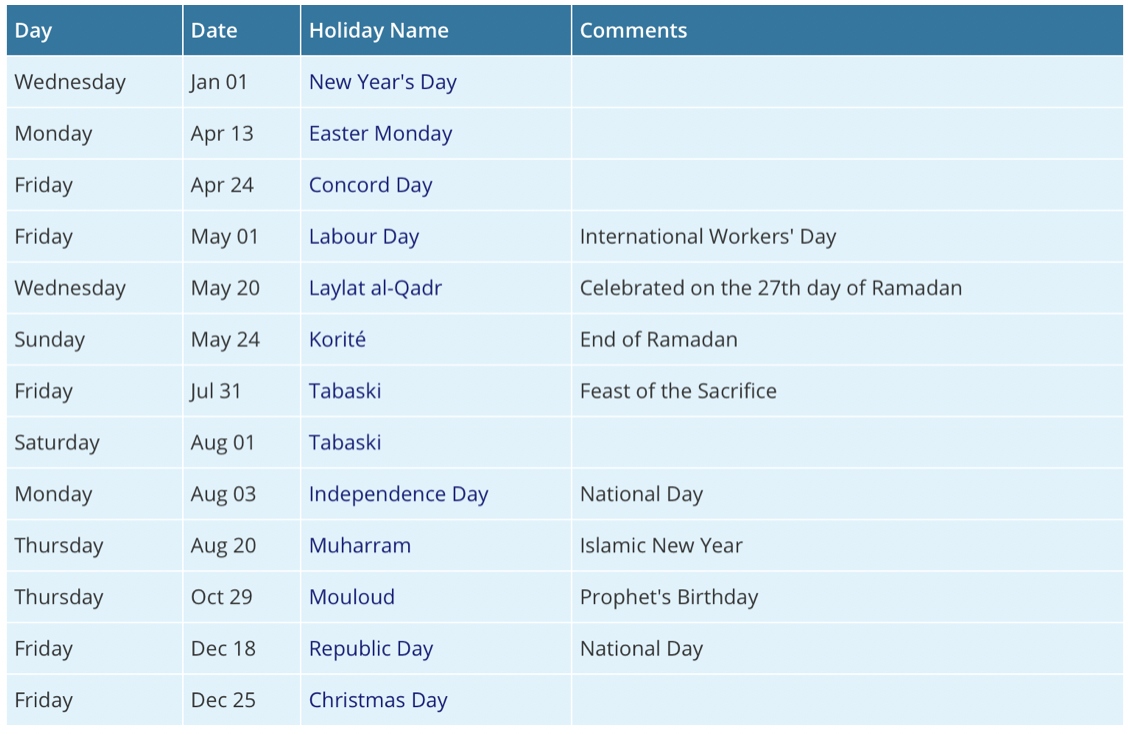
Exchange rates West African CFA franc
According to our most recent information (22nd June 2020) the West African CFA franc has the following exchange rates.
The exchange rate from your own bank or credit card company will differ somewhat from the exchange rates as mentioned above. Your bank or credit card company might also apply additional international charges.
| USD = 585.555 XOF | XOF= 0.00170778 USD |
| EUR = 655.957 XOF | XOF= 0.00152449 EUR |
| **As at 22 June 2020 |
NIGER SECURITY & RISK LEVELS
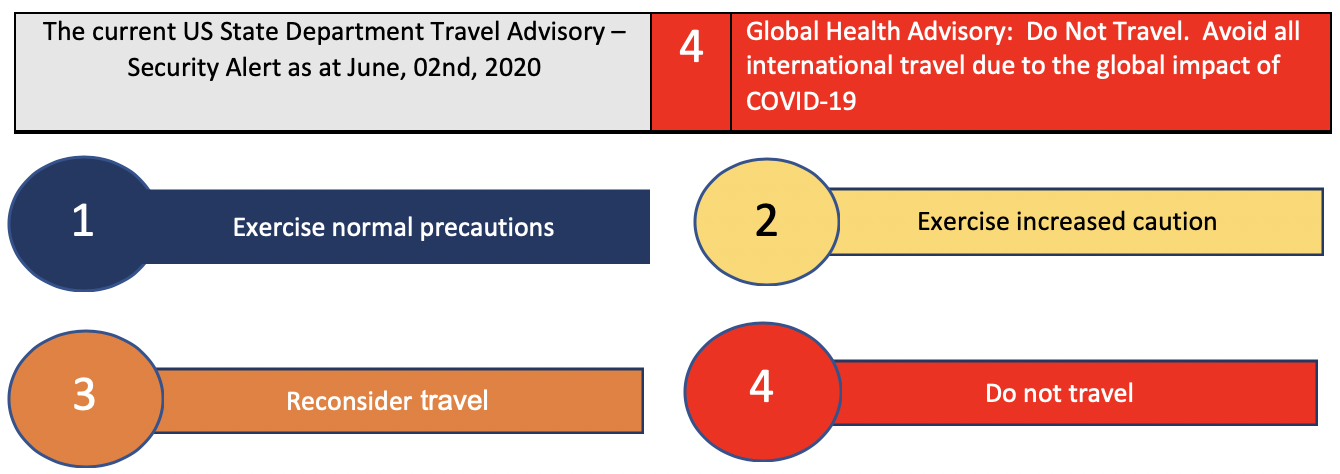
Location: Niger
Event: The Nigerien Ministry of Public Health has confirmed 958 cases of COVID-19 in Niger, including 65 deaths.
Niger’s land border closures remain in effect; they have been closed since March 19. Commercial international flights into Niger’s international airports have been cancelled until further notice.
Updates
Niger’s state of emergency for the entire country is in effect until July 11, 2020.
- As of June 1, all public schools have re-opened after being closed since March 20.
- As of May 29, bars and night clubs have been allowed to reopen.
- As of May 25, the ban on gatherings of at least 50 people, including workshops, seminars, and social ceremonies was lifted.
- As of May 25, Niger reinstated regular work hours (8am to 5pm Monday through Thursday and 8am to 1pm on Friday).
- As of May 15, the city of Niamey is no longer under a health confinement.
- As of May 13, places of worship including mosques and churches have re-opened, provided proper social distancing and hygiene measures are followed.
- As of May 13, the curfew that was in effect from 9 p.m. to 5 a.m. has been lifted.
- It is mandatory to wear a face mask or other objects that cover the mouth and nose while in public places. Everyone must also respect a distance of at least one meter between people in restaurants, businesses, and other public places.

NIGER INCIDENT MAPPING
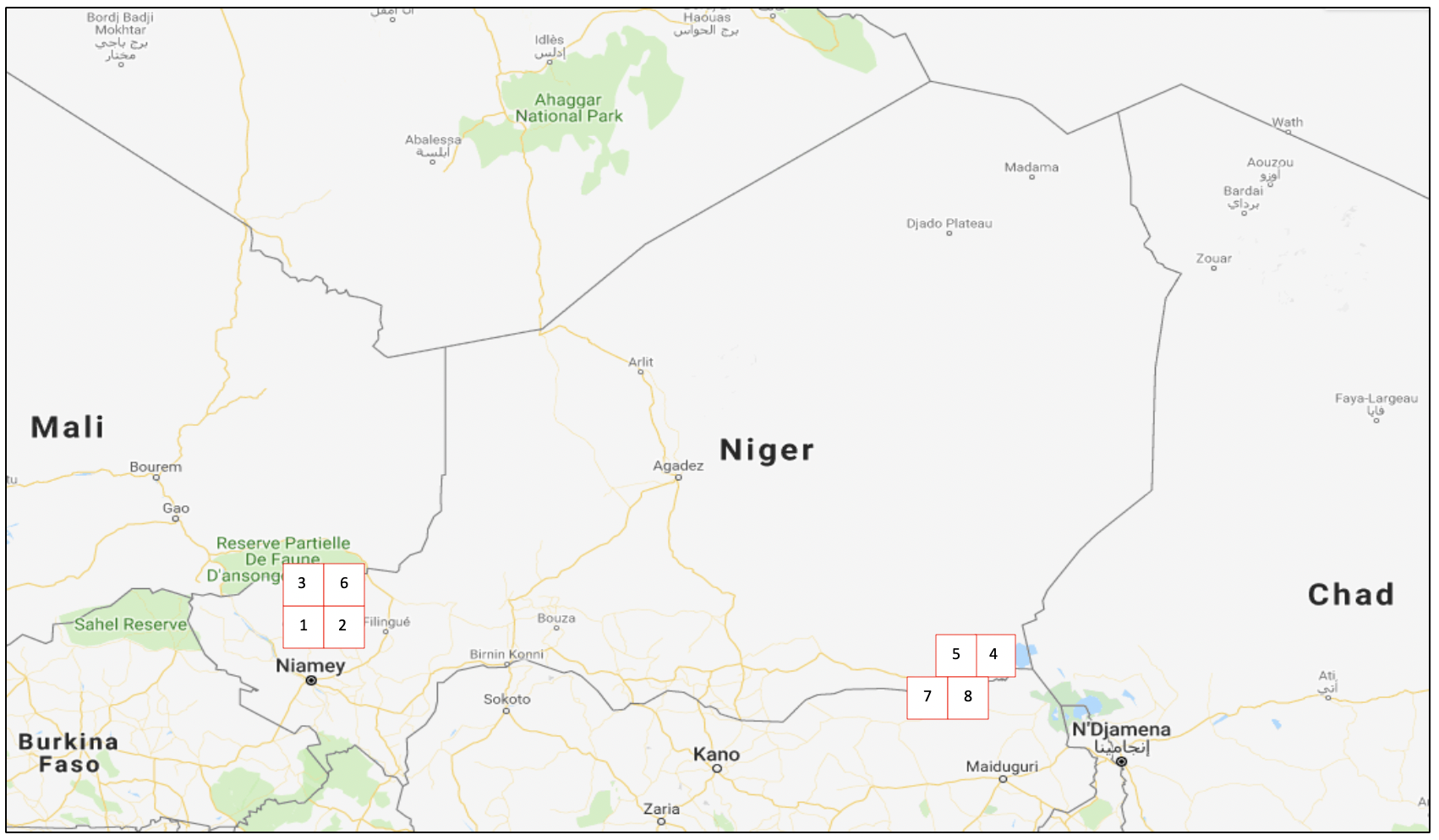
NIGER INCIDENTS IN DETAIL
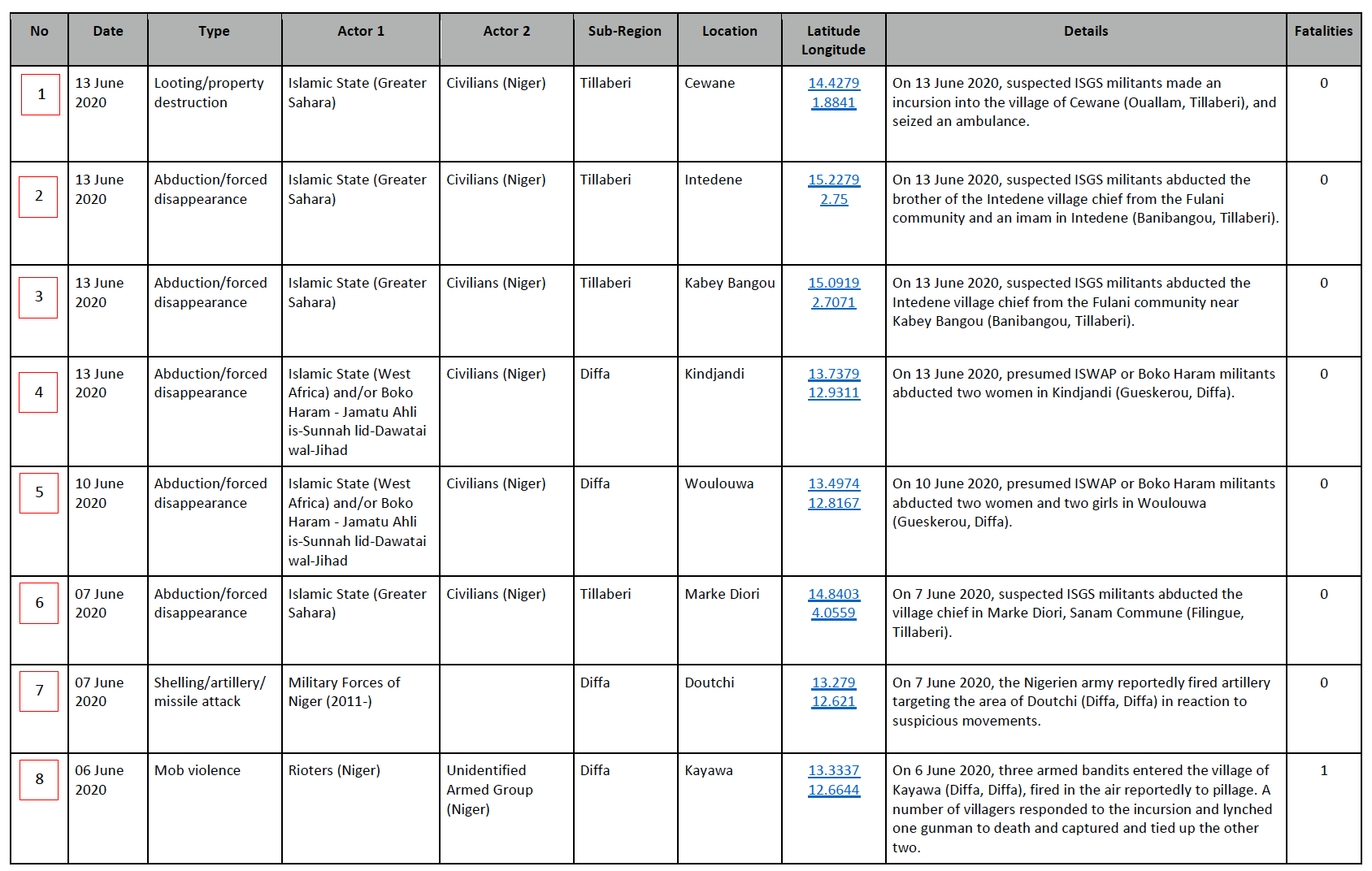
Hijacking at the Nigerien Ministry of Defense: Lawyers for suppliers’ counterattack
As the investigation continues into the embezzlement case at the Nigerien Ministry of Defense, lawyers for arms suppliers have anticipated the defense of their clients. In fact, four lawyers from the main suppliers questioned in the audit report have taken the lead, although their clients have not yet been summoned before the judges.
According to the chairman Marc le Bihan: “The observation that has been made since the start of this case is that our customers, who have nevertheless delivered almost all of the equipment that has been ordered to them, are vilified, stigmatized”. It also shows that overcharging is not illegal in Niger. Indeed, while RFI informs that the audit scrutinized 177 military equipment purchase contracts signed, for the most part, between 2017 and 2019. Thus, revealing a shortfall of more than 76 billion CFA francs for the ‘State, via overcharges, fictitious contracts, unfair competition or undelivered equipment.
But despite this report, it is not possible in Niger to seek, prosecute and indict an individual for acts of extra-billing, as explained by Maître Ismaril Tambo: “In the current state of our national law, the overcharging is not a crime”. Still according to RFI, the suppliers, on the other hand, have gone into debt with the banks in order to honor their contracts. “None of them received 30% of the start-up sale, which is however provided for in the contract. And that’s what we have to say to the people, that the state owes money today to our customers, “they add.
G5 Sahel: promising military results a few months after Pau
G5 Sahel forces display promising military results, six months after the Pau Summit, held in an atmosphere of doubt and low morale, following very deadly terrorist attacks and the death of 13 This series of attacks had called into question the legitimacy of the Barkhane operation, intended to confirm the action of France while reforming the objectives: the Summit of Pau which did not modify the objectives of Barkhane, seemed to have kept its promises.
Operation Barkhane was intended to hold the ground against the jihadist katibas and support the armies and Sahelian States towards autonomy in order to defeat the subversive strategy of the terrorists represented by the Islamic State (EIGS) and Al Qaida (RVIM).
POLITICAL OVERVIEW
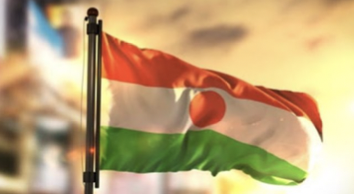
Nigerien parliamentarians ratified this Friday, June 19, 2020, the bill amending the code of criminal procedure in Niger. This reform of the Nigerian criminal law enforcement system aims to make justice more accessible at short notice and to relieve congestion in penal establishments. Indeed, recalls the Commission for General and Institutional Affairs (CAGI), ” despite the relevance of this reform, the criminal chambers created before the high courts have still not begun to sit, thus leaving the Courts of Assize the care to continue to judge the pending criminal files ”.
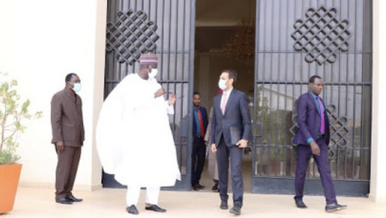
The President of the National Assembly of Niger, Mr. Ousseini Tinni, met on Thursday, June 18 in his cabinet, with the Italian Ambassador to Niger, Mr. Marco Principe. At the end of the meeting, the Italian diplomat said that their discussions focused mainly on the topical subject, in this case the management of the Covid-19 pandemic. “I have mentioned Italy’s support in terms of donating personal protective equipment” to Niger, said Marco Principe, announcing that his country will offer respirators in Niger in the coming weeks.
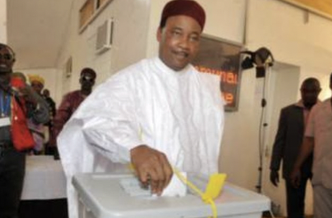
The Nigerien political opposition, grouped within the Front for Democracy and the Republic (FDR), the Front of the Independent Opposition (FOI), the Patriotic Front (FP) and the Front for the Restoration of Democracy and Defense of the Republic (FRDDR), in a declaration made public on Tuesday, June 16, 2020, rejects all the proposals resulting from the extraordinary meeting of the National Council for Political Dialogue (CNDP) held on Friday, June 12. This last session of the CNDP, in which the Political Opposition had not participated, agreed on the need to review the organization of local elections, because they could not be held on time, according to the current timetable. The Independent National Electoral Commission (CENI), on the occasion of this meeting of the CNDP, announced that it had experienced a delay in the preparation of the biometric electoral file, initially scheduled to be available on August 19, 2020, mainly because insecurity, the Covid-19 pandemic and the strike of its agents.
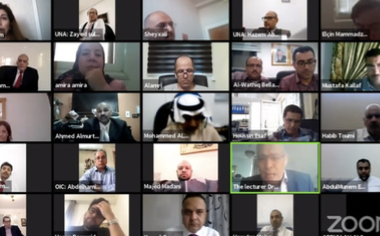
Jeddah, Saudi Arabia (UNA) – The Union of OIC News Agencies (UNA), in partnership with the Information Department of the General Secretariat of the Organization of Islamic Cooperation (OIC) and the Union Islamic Broadcasting (IBU), will organize a virtual workshop (via webinar) on Tuesday 23 June 2020 on “Methods of verifying the facts during crises and the propagation of rumors: the case of COVID-19”. UNA Deputy Director Zayed Sultan Abdullah said the workshop is available in its second version in French after having conducted the first version in Arabic on June 8, as part of the results of the first forum of the Union entitled “The role of news agencies in supporting anti-coronavirus efforts”, held on May 16 under the high patronage of the Acting Saudi Media Minister, Chairman of the Union Executive Council, HE Dr. Majid bin Abdullah Al Qasabi.
MEDICAL REQUIREMENTS AND INFORMATION
Vaccinations required to enter the country
Proof of vaccination against yellow fever is required over one year of age entering the country. The government of Niger recommends vaccine for travelers departing Niger.
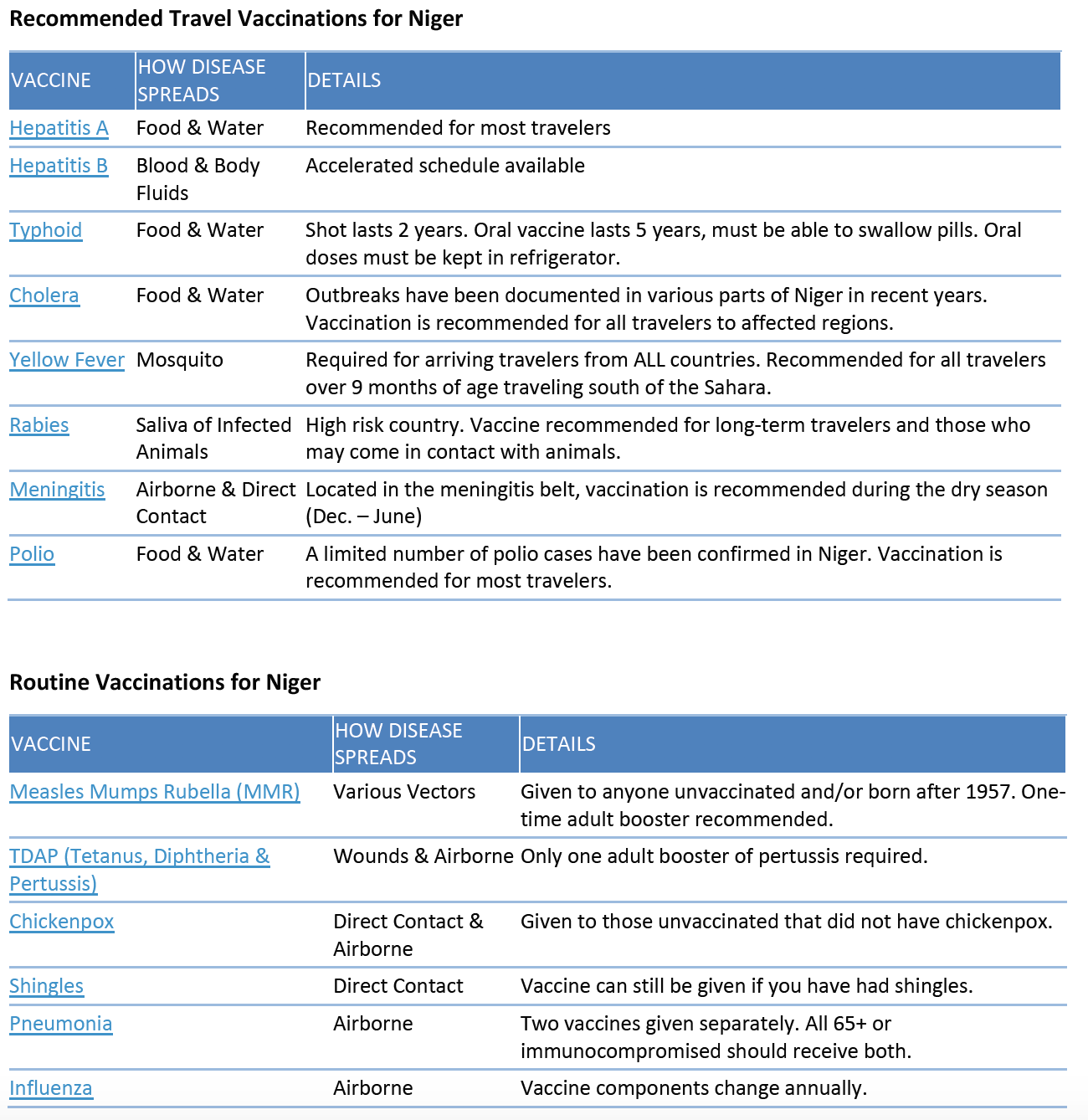
CORONAVIRUS DISEASE (COVID-19) ADVISE FOR THE PUBLIC
Wash your hands frequently
Regularly and thoroughly clean your hands with an alcohol-based hand rub or wash them with soap and water.
Why? Washing your hands with soap and water or using alcohol-based hand rub kills viruses that may be on your hands.
Maintain social distancing
Maintain at least 1 metre (3 feet) distance between yourself and anyone who is coughing or sneezing.
Why? When someone coughs or sneezes, they spray small liquid droplets from their nose or mouth which may contain virus. If you are too close, you can breathe in the droplets, including the COVID-19 virus if the person coughing has the disease.
Avoid touching eyes, nose and mouth
Why? Hands touch many surfaces and can pick up viruses. Once contaminated, hands can transfer the virus to your eyes, nose or mouth. From there, the virus can enter your body and can make you sick.
Practice respiratory hygiene
Make sure you, and the people around you, follow good respiratory hygiene. This means covering your mouth and nose with your bent elbow or tissue when you cough or sneeze. Then dispose of the used tissue immediately.
Why? Droplets spread virus. By following good respiratory hygiene, you protect the people around you from viruses such as cold, flu and COVID-19.
If you have fever, cough and difficulty breathing, seek medical care early
Stay home if you feel unwell. If you have a fever, cough and difficulty breathing, seek medical attention and call in advance. Follow the directions of your local health authority.
Why? National and local authorities will have the most up to date information on the situation in your area. Calling in advance will allow your health care provider to quickly direct you to the right health facility. This will also protect you and help prevent spread of viruses and other infections.
Stay informed and follow advice given by your healthcare provider
Stay informed on the latest developments about COVID-19. Follow advice given by your healthcare provider, your national and local public health authority or your employer on how to protect yourself and others from COVID-19.
Why? National and local authorities will have the most up to date information on whether COVID-19 is spreading in your area. They are best placed to advise on what people in your area should be doing to protect themselves.
Protection measures for persons who are in or have recently visited (past 14 days) areas where COVID-19 is spreading
Follow the guidance outlined above.
Stay at home if you begin to feel unwell, even with mild symptoms such as headache and slight runny nose, until you recover.
Why? Avoiding contact with others and visits to medical facilities will allow these facilities to operate more effectively and help protect you and others from possible COVID-19 and other viruses.
If you develop fever, cough and difficulty breathing, seek medical advice promptly as this may be due to a respiratory infection or other serious condition.
Call in advance and tell your provider of any recent travel or contact with travelers.
Why? Calling in advance will allow your health care provider to quickly direct you to the right health facility. This will also help to prevent possible spread of COVID-19 and other viruses.
